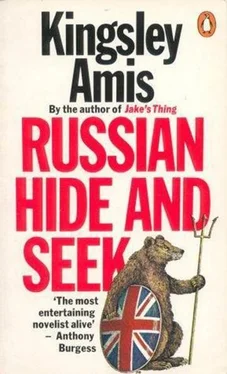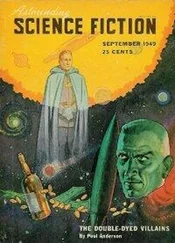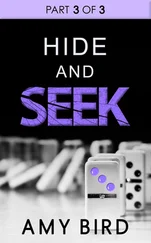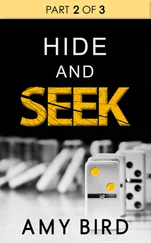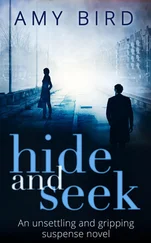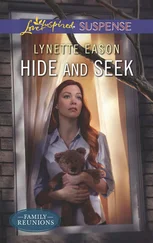Kingsley Amis - Russian Hide-and-Seek
Здесь есть возможность читать онлайн «Kingsley Amis - Russian Hide-and-Seek» весь текст электронной книги совершенно бесплатно (целиком полную версию без сокращений). В некоторых случаях можно слушать аудио, скачать через торрент в формате fb2 и присутствует краткое содержание. Жанр: Современная проза, на английском языке. Описание произведения, (предисловие) а так же отзывы посетителей доступны на портале библиотеки ЛибКат.
- Название:Russian Hide-and-Seek
- Автор:
- Жанр:
- Год:неизвестен
- ISBN:нет данных
- Рейтинг книги:3 / 5. Голосов: 1
-
Избранное:Добавить в избранное
- Отзывы:
-
Ваша оценка:
- 60
- 1
- 2
- 3
- 4
- 5
Russian Hide-and-Seek: краткое содержание, описание и аннотация
Предлагаем к чтению аннотацию, описание, краткое содержание или предисловие (зависит от того, что написал сам автор книги «Russian Hide-and-Seek»). Если вы не нашли необходимую информацию о книге — напишите в комментариях, мы постараемся отыскать её.
A handsome and highly sexed young Russian cavalry officer, Alexander Petrovsky, joins the plot and learns to his regret that politics and playmates don't mix.
"Funny, cynical, captivating-Amis makes an implausible situation almost believable, then lets his characters worry their way out." (B-O-T Editorial Review Board)
Russian Hide-and-Seek — читать онлайн бесплатно полную книгу (весь текст) целиком
Ниже представлен текст книги, разбитый по страницам. Система сохранения места последней прочитанной страницы, позволяет с удобством читать онлайн бесплатно книгу «Russian Hide-and-Seek», без необходимости каждый раз заново искать на чём Вы остановились. Поставьте закладку, и сможете в любой момент перейти на страницу, на которой закончили чтение.
Интервал:
Закладка:
‘Put it? I just said to him, out of the Korotchenko fellow’s hearing of course, I said, “What do you wager there isn’t a spot of kissing going on outside at this moment?”, and as I say he wouldn’t take me. He said, “I wouldn’t stake ten pounds against that young spark doing anything in that line you care to name.” You see, he knows you too.’
Alexander took his turn to laugh and his father soon joined in. The pair of them went on for some time, like people in a play.
They did a lot of laughing in that house.
4
Shortly before eight o’clock the next morning a large blue motor-car was making its way through the surrounding park by means of a roughly-made road lined with strong young elms. At the sound of its approach the children from the lesser houses, those occupied by the lesser functionaries of the district administration, came running out to watch it pass, as their great-great-grandparents would have done at their age. Its passenger could not but be a person of unusual celebrity.
Commissioner Michael Mets was such a one, though he would have been rather embarrassed at the description. He was forty years old, strong and active, with a sharp nose and alert brown eyes behind spectacles. A brown imitation-leather dispatch-case lay beside him. Actually there was a second passenger: on the folding seat diagonally across from Mets there sat a young soldier in uniform with a pistol at his hip. The weapon was not loaded; the original necessary edict laying down armed escort for all notables had been retained in a period when that escort’s most strenuous duty was likely to be the carrying of parcels.
The car swept round a curve to the left, entered the court below the west front of the Controller’s residence and pulled up by the steps. Mets got out and ran his eye over the façade, adjusting his short belted jacket and student’s cap. There was an inscription below the roof, somewhat defaced but still legible. ‘Hora e sempre,’ he said aloud. Presumably archaic Italian, meaning ‘now and always’. Unless there was an accent on the second word, which would make it ‘now is always’. He took a few steps backwards to see better, but was unable to settle the question. Anyway, he ought to have known, just as he ought to have known whether the stylised lions on the roof were of stone or of some synthetic material.
The chauffeur had parked the Rolls out of the sunshine, which was already quite hot, and with the escort at his side came to join Mets outside the front door. The white-haired, brown-liveried butler let them in, showed Mets into the dining-room and led the other two off towards the kitchens. A few minutes later Alexander came hurrying down the staircase, singing quietly to himself and thinking of Mrs Korotchenko. He thought of her all over again when he noticed the fawn wrap-like object in the hand of a passing housemaid.
‘Where did you find that?’
‘One of the English gardeners brought it, your honour,’ said the girl, startled. ‘He said he found it on the lawn.’
‘And where are you taking it?’
‘To your honoured mother, sir. She may know who it belongs to.’
‘Give it to me.’
He half-snatched it, ran back the way he had come and stuffed the offending garment into a drawer among his ties and stocks. God in heaven, he said to himself as he made the outward journey a second time, how had the bitch forgotten it, at the time and later? How had she not seen it lying there? -there had been more than enough moonlight. Why had no one else noticed its absence? – women kept a keen eye on one another’s clothing. Had she left it on purpose? Why? Such speculations, and where they led, flawed the perfect composure with which he had hoped to meet Commissioner Mets; but in these matters he was his own severest critic by far.
‘How do you do,’ said Mets when they were introduced.
‘It’s an honour to make your acquaintance, sir.’ Alexander fired that off readily enough and noted with satisfaction the tiny signs of approval and mild surprise behind the other’s glasses.
‘This lad knows more about the English than almost anybody outside the Commission,’ said Petrovsky.
‘And more than a great many people inside it too, I warrant, including myself with my pitiful year of service in the field,’ said Mets pleasantly, and went on without pausing,
‘This is a confidential meeting, which is why I asked your father if we could have it here rather than in the middle of either of our respective offices. I have some things to say I wouldn’t like my staff to hear.’
‘I understand, sir.
‘How much do you know about the work we’re doing?’
‘Only a rough general picture.’ By now Alexander had helped himself to liver, fried eggs, and ale and had settled himself at table on his father’s left opposite Mets.
‘In that case it will probably be quicker if I assume your total ignorance and start from that point, but before I proceed I must do some justice to this appetising fare. Excuse me.’
And he fell to. Petrovsky looked through a document, no doubt brought by Mets, as he ate; Alexander glanced at a newspaper. Energy production had increased. An underminister of communications had resigned for reasons of ill-health. The President of Cuba was visiting the President of South Africa. All was quiet throughout the world: nobody was being invaded, massacred, driven into the jungle, harassed by guerrillas or terrorists, deported, refused permission to travel or so much as shot at, except in cases involving criminals, and since the introduction of advanced techniques of detection and punishment the number of such persons had been falling daily. Boredom and gloom swept through him like a wave of heat. What was he doing, sitting in this preposterously comfortable and richly-furnished room alongside these two self-important boobies with the supposed object of offering advice on a subject about which he knew little and cared less? He munched his food savagely, as if he were destroying an enemy.
Mets’s masticatory procedure was more practical: he cleared his plate with a speed and efficiency that might have been guessed to be characteristic of the way he handled his work. When he had finished he answered a couple of queries of Petrovsky’s about the document and then said with his precise articulation,
‘Shall I hold forth? I’m sorry, Controller-I’m afraid you’re going to be desperately bored by some of this. I’ll keep it as short as I can.’
‘I find these days I can’t hear things too often, Commissioner.’
‘So you say. Now the New Cultural Policy for England was first framed nine years ago, though it really started both earlier and later than that. As far back as the first decade of the century it was beginning to be felt, in Moscow and in London, that the denationing programme, though instituted for good and sufficient reasons at the time, was becoming unnecessary and even retrogressive. However, the first practical step, in the shape of the regional reafforestation schemes, was some time coming, and NCPE similarly dragged its feet – well, renationing can’t be a quick job. The forestry and rural engineering people, I’m told, have their eyes on 2100 for the complete restoration of the English countryside, and between ourselves I take that as about the target date for English culture too, though officially it’s 2060.
‘There are of course a number of intermediate objectives, the nearest of which is to be quite soon, on 15th September to be exact, our Festival, which I see you’ve heard of, Ensign Petrovsky. Perhaps I should explain that it’s “our” Festival in two senses. It’s a national affair, planned by us of NCPE, but we ye decentralised it into the districts, each of which will run its own programme with local material. We in Northampton don’t see ours as a grand affair, our resources are limited, but it is a significant event and it will attract notice and interest; above all, we expect to learn from it. The state of our preparedness is… varied. I should explain that we have six main sections: visual arts, theatre, music, literature, religion, and architecture and interior decoration, the last two grouped together. Visual arts is really in quite a satisfactory state: we’ve collected nearly eight hundred paintings and other objects, many of them certified as meritorious, we have framing and mounting facilities and above all we’ll be ready in time. Of music there’s a positive superfluity: a surprising number of tapes came to light and quite a few of the old discs -yes, after all this time. We even got hold of some sheet music. We’ll have to use our own performers, naturally, but that won’t matter with the instrumental numbers, the pop-group-scene was an international phenomenon anyway, and with at least some of the other songs we have some noteworthy reconstitutions, the work of an outstanding young man in the section called Theodore Markov.’
Читать дальшеИнтервал:
Закладка:
Похожие книги на «Russian Hide-and-Seek»
Представляем Вашему вниманию похожие книги на «Russian Hide-and-Seek» списком для выбора. Мы отобрали схожую по названию и смыслу литературу в надежде предоставить читателям больше вариантов отыскать новые, интересные, ещё непрочитанные произведения.
Обсуждение, отзывы о книге «Russian Hide-and-Seek» и просто собственные мнения читателей. Оставьте ваши комментарии, напишите, что Вы думаете о произведении, его смысле или главных героях. Укажите что конкретно понравилось, а что нет, и почему Вы так считаете.
